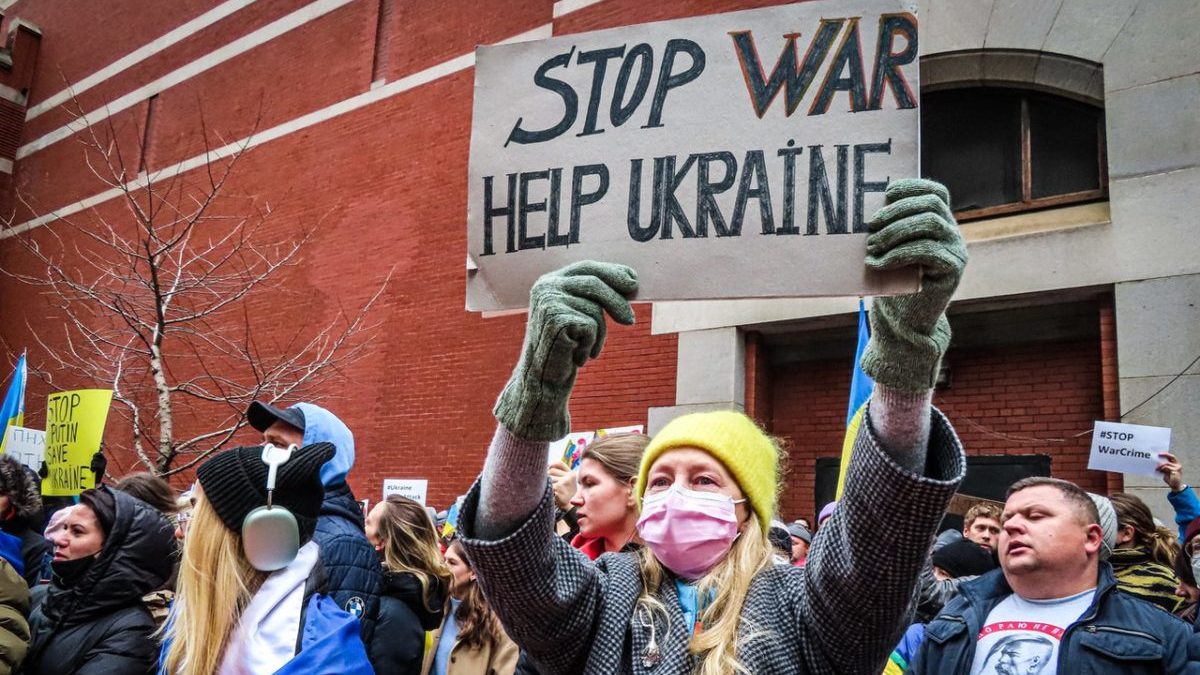Many religious freedom watchers fear that if Russia is successful in overthrowing Ukraine’s elected government, the nation’s evangelical community, especially Baptists, likely will be under increased threat of persecution.
Post-Soviet Russia was established as a secular state, but in the past two decades, Russia has begun to differentiate between “traditional” and “nontraditional” religions, with “traditional” religion meaning the Russian Orthodox Church, the National Review reported. Many believe Russian President Vladimir Putin’s end game includes cracking down on evangelical Christians in Ukraine and empowering the Russian Orthodox Church, which has close ties to the Kremlin.
“Putin’s use of traditional Christianity is calculated for political effect,” noted a Feb. 22, 2019, article published by The Heritage Foundation, an American think tank based in Washington. The Heritage Foundation warned that Putin’s close ties with the Russian Orthodox Church and “public affinity for Christianity” were likely political in nature rather than sincerely held religious values, and “American and European observers would do well to see through the charade.”
Putin has long used the common Orthodox character of Russia and Ukraine in his arguments for closer alignment, according to Knox Thames, former special envoy for religious minorities at the U.S. Department of State during the Obama and Trump administrations.
Religious expression in Ukraine
“Ukraine is unique in that several expressions of eastern Christianity are practiced there. On one side is the Russian Orthodox Church and its Ukrainian denomination, the Ukrainian Orthodox Church-Moscow Patriarchate. On the other is the Orthodox Church of Ukraine-Kyiv Patriarchate,” Thames wrote in a Feb. 24 op-ed article published by Religion News Service.
“Putin’s efforts to restore Russian prestige have included elevating the Russian Orthodox Church to the center of Russian identity while also undermining the independence of the Moscow Patriarch,” Thames said. “According to the Orthodox Times, Russia used disinformation campaigns to stir conflict between the churches.”
Those efforts came to a head in late 2018, when the Orthodox Church of Ukraine-Kyiv Patriarchate sought to separate from the Ecumenical Patriarch of the Orthodox Church. Afraid of Russian interference, the Kyiv Patriarchate believed attaining independence would allow the OCU-KP to break free from the Moscow Patriarchate, removing itself from under its authority.
This religious battle threatened to split the Orthodox Church and was another example of Ukraine pivoting away from Moscow and toward Europe, according to Thames.
The schism between the two branches of Orthodoxy has never been more evident. The head of the Russian Orthodox Church on Feb. 27 called Moscow’s opponents in Ukraine “evil forces,” while the head of the independent Orthodox Christian Church based in Ukraine likened Putin to Hitler, saying “the spirit of the Antichrist operates in the leader of Russia.”
Ukrainian officials have accused the Russian Orthodox Church in Ukraine of being a tool of Russian foreign policy. A New York Times report published March 2 said priests loyal to Russia preached sermons recommended by its leadership on Feb. 27, the first Sunday following the Russian invasion. Those sermons, the Times reported, emphasized pacifist messages, even as Ukrainians sought to defend their national sovereignty.
‘Full capitulation’
The president of the European People’s Party, Donald Tusk, said his sources say “de facto what Putin wants is the full capitulation of Ukraine.”
And make no mistake, Thames said. That capitulation is both physical and spiritual.
“Russian control of Ukraine would be a humanitarian disaster and a human rights catastrophe,” he said. But if Russia’s military campaign is successful, “the implications for religious freedom in Ukraine would be dire.”
Not only would the independent Orthodox Church of Ukraine likely be forced back into the family of the Russian Orthodox Church, but “Russia’s regressive treatment of Jehovah’s Witnesses, Muslims and proselytizing groups would likely be forced on the entire country,” Thames said.
In 2017, Russia banned Jehovah’s Witnesses, calling them an extremist organization. Only days prior to Russia’s invasion of Ukraine, the European Court of Human Rights found that Russia has violated Jehovah’s Witnesses’ rights to liberty and freedom of religion. A spokesperson for Jehovah’s Witnesses told Religion News Service there have been 1,700 raids on the homes and places of worship of his group, in which personal items and religious materials were seized. In some cases, religious leaders were arrested.
Though no one can say with certainty what Putin’s end game is for Ukraine politically or spiritually, his actions have put ministries in Russia on high alert. The Russian Law on Freedom of Conscience and Religious Associations provides basic regulations for religious life. It was adopted in 1997 and has been amended almost every year since then; many of these amendments have worsened the plight of freedom of religion and belief in Russia, according to the organization Human Rights Without Frontiers.
In April 2021, Putin signed an amendment to the law that initiates significant changes for ministries across Russia, according to Forum 18, a Norwegian human rights organization that promotes religious freedom. The amendment, which was set to go into effect in October, covers a wide range of religious issues under the guise of “protecting the spiritual sovereignty of Russia,” but few details on how the law is being implemented are available.
What is known is that the amendment requires that all missionaries, clergy and religious teachers educated abroad must receive “additional professional education in the field of the basics of state-confessional relations in the Russian Federation.” In effect, if a missionary or pastor received their religious training outside Russia, they are required to receive additional State-authored education. While the new law does not apply to those already in engaged in ministry, it applies to every new pastor or missionary going forward regardless of whether they are foreign or Russian citizens.
Crackdown in Russia
Other changes including forbidding groups or NGOs from using any religious identifiers in their name unless permitted by the local, government-approved Centralized Religious Organization. The list of people now banned from leading or even participating in religious groups has also been significantly expanded.
The law was negatively received by most religious organizations in the country, though the Russian Orthodox Church supported it, according to Olga Sibireva, head of the Moscow-based Religion in Secular Society Project.
“Representatives of other religious organizations,” she observed, “consider the draft law a threat to freedom of religion and its norms as an attempt of the state to strengthen its ability to interfere with the internal activities of religious organizations.”
The U.S. Commission for International Religious Freedom considers Russia a Country of Particular Concern for its significant religious freedom violations. Countries receiving this designation engage in “systematic, ongoing, egregious violations of religious freedom,” including violations such as torture, prolonged detention without charges, forced disappearance or other flagrant denial of life, liberty or security of persons.
Brent Leatherwood, acting president of the Southern Baptist Convention’s Ethics & Religious Liberty Commission, said Putin seems to be “consumed” with reclaiming territory and countries that formerly comprised Greater Russia. The annexation of Crimea in early 2014 was a first step. Now the entire country of Ukraine is in Putin’s sights. And freedom of religion in the region seems to hang in the balance.
“Whether it’s paranoia or an appetite for conquest, it’s clear his efforts are not just about geographic size, as they include recreating the suffocating and oppressive conditions faced by evangelicals and religious minorities in the Soviet era,” Leatherwood told The Baptist Paper. “With restrictions on ‘missional activity,’ state opposition to the unauthorized sharing of one’s faith and burdensome requirements for ministries, Russia is making a concerted attempt to stamp out religious freedom.
“In Crimea, evangelicals have been the most targeted group as Russian influence has grown since the 2014 invasion,” he added. “This portends an ominous future for religious liberty in Ukraine should Putin succeed.”










